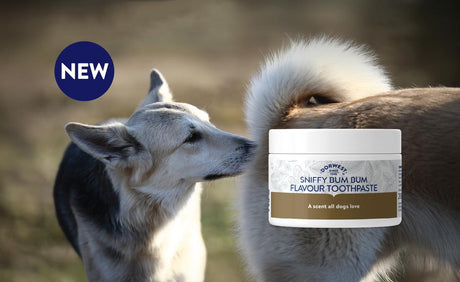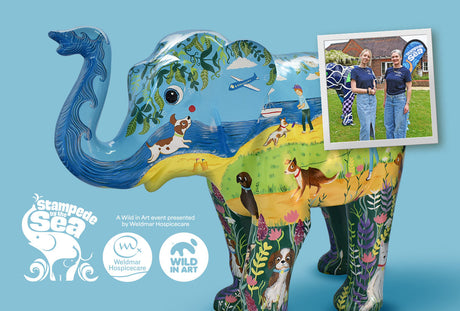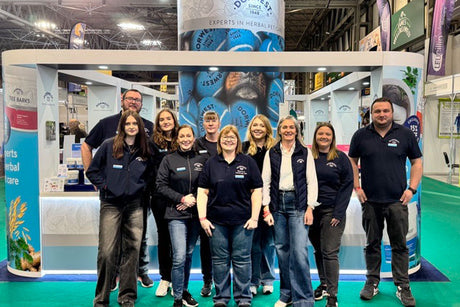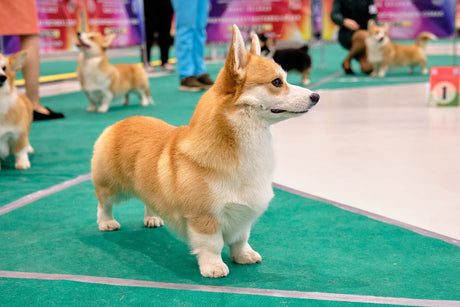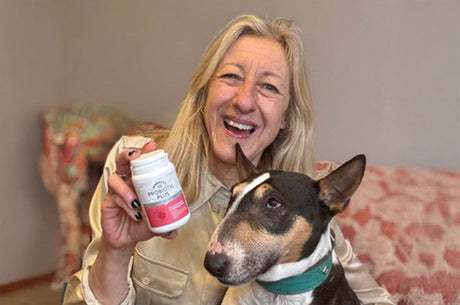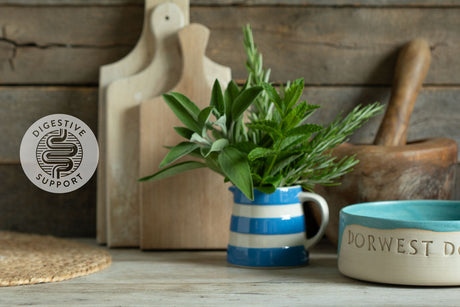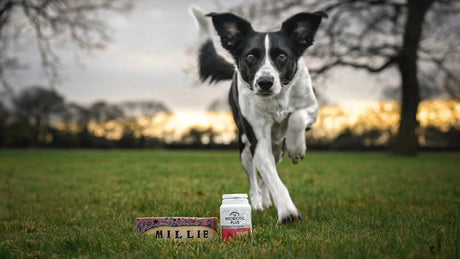
Home is where the heart is, especially when filled with dogs! As well as dogs, many of us are also filling our homes with plants. Whilst there are plenty of benefits to adding some greenery, did you know there can be some hidden dangers to your four-legged friend from the green additions in your home? As it's Plant Week, we're going to help you avoid some common poisonous houseplants for dogs, identify telltale signs if you suspect your dog has consumed part of one, as well as showcase some great safe options for your home. Get those gardening gloves at the ready...
5 Houseplants Toxic to Dogs
Poinsettia (Euphorbia pulcherrima): With its gorgeous red colour, this is such a popular plant, especially as a gift at Christmas time. Sadly, it can be a very unwelcome gift for your dog if they ingest or come into contact with one. This particular houseplant is toxic to dogs and therefore, your dog needs to avoid all of it. Especially the leaves, the stems and the sap as these all present some dangers. From stomach complications if consumed, such as diarrhoea, to eye irritation if the sap gets into your dog's eye. There have also been reports of skin complaints, such as dermatitis. Once checked with a professional, we recommend using our Skin Balm to keep sensitive skin healthy.
Aloe Vera (Aloe vera): Another houseplant toxic to dogs is Aloe Vera. Although it is a plant well known for its incredible external soothing properties, this one might surprise you! If your dog chews or ingests the leaves, this can cause vomiting and diarrhoea. Within the leaves of the Aloe Vera plant is a chemical called saponin which can be toxic to our four-legged friends. It's a plant that might prove tempting for dogs to chew, especially if they're a puppy exploring with their mouths. Ensure these are kept out of reach and can't be knocked down either. If you find your dog has chewed Aloe Vera, ensure you see a vet to get treatment. However, if your dog suffers from general digestion problems, then our Digestive Tablets for dogs can be a great help!
Ivy (Hedera helix): This plant is ideal for decoration as it drapes beautifully and because of this, could prove quite tempting to a dog. Removing this temptation would be wise. Ivy also contains saponin and other compounds, which are not a good match for dogs. The whole plant needs to be avoided, as if consumed, it can cause diarrhoea and can also cause skin irritation. Ensure you're not draping it anywhere where your dog can come into contact with it.
Mistletoe (Phoradendron flavescens): Whilst not a traditional houseplant, many of us bring in mistletoe during the festive period. Although it’s a fun addition to your home, the berries can cause stomach issues and can be fatal to puppies if ingested. This houseplant is toxic to dogs as it impacts the gastrointestinal tract. Therefore, it is advisable to keep all mistletoe out of the home.
Peace Lily (Spathiphyllum wallisii): Don't let the welcoming name or the beauty of this plant fool you. The Peace Lily is not on the list of safe house plants for dogs! It can cause a lot of irritation to your dogs’ mouth and can cause stomach issues too. Be sure to administer digestive aid for your dog should they come into contact with a Peace Lily, once you have spoken to a vet.
5 Telltale Signs Your Dog May Have Eaten A Poisonous Plant
If you fear your dog may have ingested a house plant toxic to dogs, firstly don't panic. There are very few which are fatal but it's important you act fast to reduce discomfort and minimise any lasting damage. Always consult your veterinary professional if you're concerned. To help you, here are some common signs your dog may have eaten a poisonous plant:
Issues with their mouth: You may notice your dog pawing at their mouth, producing excess saliva, gagging or having difficulty swallowing. This could indicate your dog is having some issues with their mouth, potentially due to ingesting a houseplant that’s toxic to dogs.
Breathing changes: Is your dog showing signs of respiratory distress e.g excessive panting without obvious cause? Has the pace of their breathing altered e.g. slower or faster than usual? These can be a clear sign of illness or that they have been in contact with a houseplant that’s toxic to dogs.
Changes in movement: Have you noticed your dog's co-ordination is altered? Are they a little unsteady on their paws? Perhaps they're having difficulty remaining on all of their paws too? All potential indicators of some form of poisoning.
Changes in behaviour: If your dog shows changes to their usual behaviour, it may indicate your dog feels off-colour. This could be a lack of interest in their food, sleeping more than normal, or disinterest in usual activities. There are many reasons for this, but one of these may involve the ingestion of a houseplant that’s toxic to dogs.
5 Safe Houseplants For Dogs
To round off, it's important to note that not all houseplants are dangerous. In fact, there are plenty of safe plants for dogs!
Moth Orchid (Phalaenopsis): These require specific conditions to thrive but look beautiful with their pink, white or purple flowers.
Kentia Palm (Howea forsteriana): If you're looking for a larger houseplant safe for dogs, this is a great option. It can grow up to 3 metres high, 2 metres wide so it might even grow to be bigger than your dog.
Boston / Sword Fern (Nephrolepsis exaltata): Incredibly, these are named as one of NASA’s top 10 air purifying plants. These do like to cascade though. You should ensure they don't prove too tempting to your dog to pull as you won't want soil on your carpet. You might want to consider a plant stand or placing on a higher shelf.
Parlour Palm (Chamaedorea elegans): Parlour Palm are a great safe plant for dogs. These are listed on NASA’s list of 50 Indoor plants that clean the air. A pawfect addition to the home.
Cast Iron Plant (Aspidistra elatior): A lovely evergreen which, as the name suggests, is easy to grow due to its cast iron constitution.
Please note: If you're adding anything other than water to your houseplants such as compost or plant food, avoid doing so or ensure the plants are out of complete reach from your dog. This could end up turning a safe plant for dogs into a not so safe plant for dogs, so remember to be cautious.
Further Tips For Identifying The Houseplants Toxic To Dogs
There are a number of plants both inside and outside of the home to be mindful of when it comes to your dog. If you want to avoid further house plants toxic to dogs , check out the Gardeners World website. When searching for plants, this website helpfully lists if they are known to be toxic to our pets. Dogs Trust also have a very helpful list to review. It's worth noting both of these lists are not exhaustive. We'd always recommend you do your own research before adding any new greenery to your home. Also, always remember to consult a veterinary professional if you're concerned your dog may have ingested something they shouldn't.
Get Support and Advice from Herbal Pet Care Experts
Once you have discussed any concerns with your vet, you may want to support your pet with some of our digestive aid for dogs. These include our tree bark for dogs, Keeper’s Mix Sensitive or other supplements. For any advice on how to dose our digestive tablets for dogs, please get in touch. Our team are experts in herbal pet care and are more than happy to help. Contact us on +44 (0) 1308 897 272. Alternatively, email us at info@dorwest.com or fill out our online contact form.
